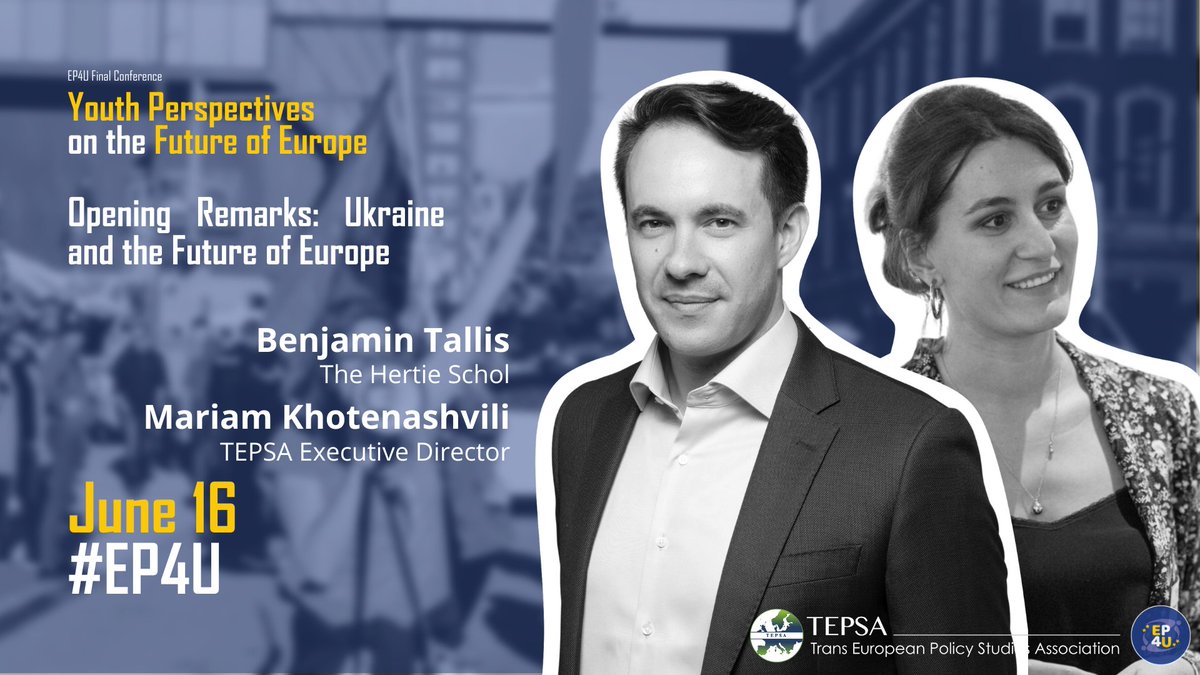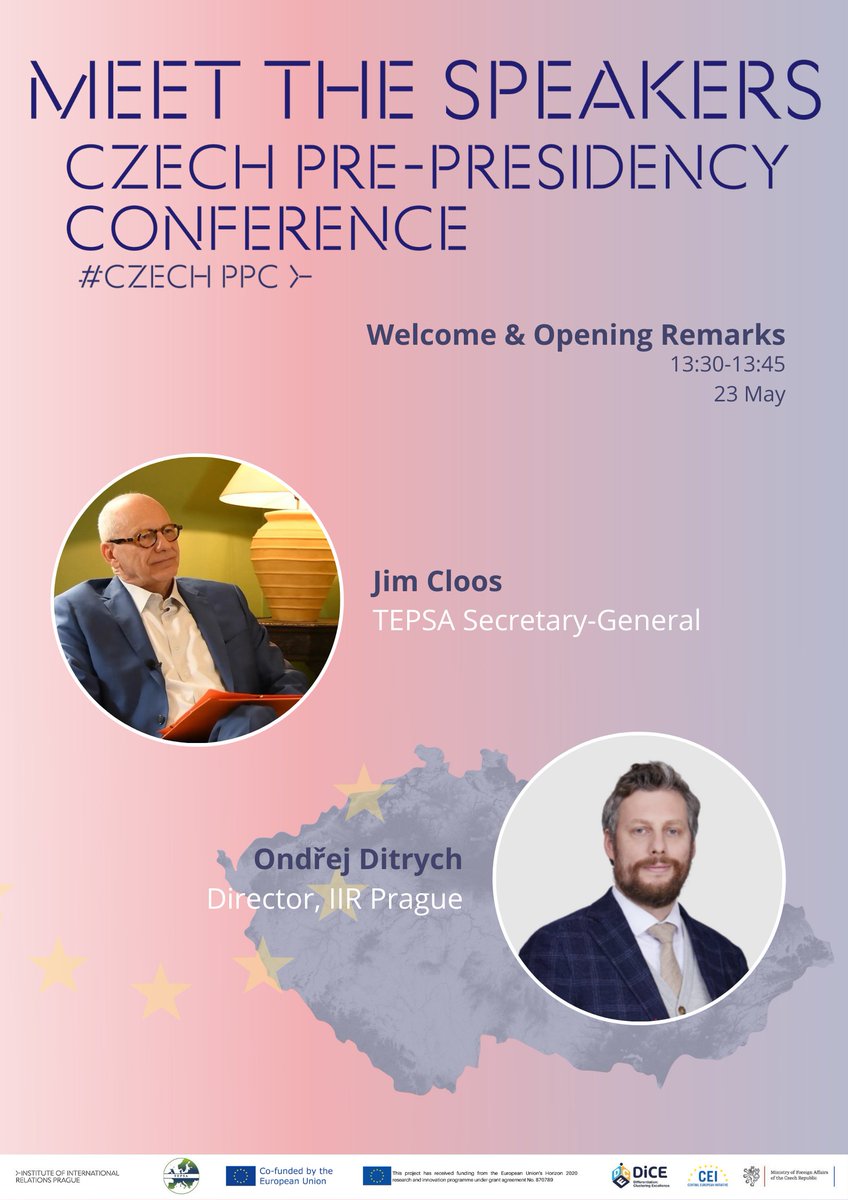
We are live at the @iprinova online event: “EU-Russia Relations and the War in #Ukraine: from a Portuguese Perspective”!
As always, we will be highlighting the best bits here on Twitter
Follow along on YouTube:
/THREAD 🧵
As always, we will be highlighting the best bits here on Twitter
Follow along on YouTube:
/THREAD 🧵

The debate features the expert contributions of:
- Sónia Sénica (@ssenica), Research Fellow at @iprinova
- Helena Ferro Gouveia (@camalees), Administrator at @Lusa_noticias
- Diana Soller (@diana_soller), Research Fellow at @iprinova
/2
- Sónia Sénica (@ssenica), Research Fellow at @iprinova
- Helena Ferro Gouveia (@camalees), Administrator at @Lusa_noticias
- Diana Soller (@diana_soller), Research Fellow at @iprinova
/2
This event takes place in the framework of our upcoming book “Russia and the Future of Europe: Views form the Capitals”, published by @SpringerNature and edited by @MichaelKaeding (@unidue), @JohannesPollak (@WebsterVienna), and @_PaulSchmidt (@oegfe)
/3
/3
@ssenica introduces the book, describing it as “a collection of national perspectives on the future of the EU and diverse national relations towards Russia”
/4
/4
After that introduction to TEPSA’s upcoming book on EU-Russia relations, @ssenica presents her chapter on perceptions of #Russia in 🇵🇹
/5
/5
“Good bilateral diplomatic relations between a new Portuguese liberal democracy and a Russian “sovereign democracy” shaped the 1990s”
- @ssenica (@iprinova)
/6
- @ssenica (@iprinova)
/6
“Portuguese foreign policy has been largely influenced by its transatlantic relations, its #EU membership and the significant Portuguese diaspora. As you see, Russia is not on the agenda!”
- @ssenica (@iprinova)
/7
- @ssenica (@iprinova)
/7
“Recently, in our multipolar world, Russian foreign policy can be characterized as neo-imperialistic. Due to the #WarinUkraine, #Portugal has aligned itself with its international partners in condemning the #RussianAggression, including sanctions ”
- @ssenica (@iprinova)
/8
- @ssenica (@iprinova)
/8
“The #InvasionofUkraine destabilized the international order and caused a strengthening of #NATO and caused a multidimensional crisis in which Portugal aligns itself and its values with its Western partners ”
- @ssenica (@iprinova)
/9
- @ssenica (@iprinova)
/9
On this note @ssenica passes the floor to @camalees for her take on EU-Russia relations and the future of Europe 🇪🇺
/10
/10
“The way #Germany positions itself towards #Russia will determine the collective European response ”
- @camalees (@Lusa_noticias)
/11
- @camalees (@Lusa_noticias)
/11
“The key principles of #Ostpolitik remained in practice under #Merkel’s leadership. Until the #InvasionofUkraine, the German-Russian relations seemed as stable as ever. The then undertaken #Zeitenwende is the biggest German foreign policy shift.”
- @camalees (@Lusa_noticias)
/12
- @camalees (@Lusa_noticias)
/12
“#Zeitenwende is real but the country remains the same! Power politics are back and the European security policy has adapted to the #RussianAggression”
- @camalees (@Lusa_noticias)
/13
- @camalees (@Lusa_noticias)
/13
“Business as usual with #Russia – change through trade – is no longer an option for the #EU. We are shifting from #Ostpolitk towards a new Frostpolitik charaterized by uncertainty”
- @camalees (@Lusa_noticias)
/14
- @camalees (@Lusa_noticias)
/14
Following this presentation by @camalees , @diana_soller now discusses the #WarinUkraine and its outcomes for #Europe
/15
/15
“The #G7 was an extension for the West dealing with #Russia. International common goods have been a vital element of 🇺🇸 and 🇪🇺 foreign policy, gaining importance during the #pandemic and even more when the #WarinUkraine started ”
- @diana_soller (@iprinova)
/16
- @diana_soller (@iprinova)
/16
“10 years ago we were trying to normalize our relations with Russia! And today we are looking for ways to strengthen @NATO to contain #Russia from expanding its territory to the West”
- @diana_soller (@iprinova)
/17
- @diana_soller (@iprinova)
/17
“In one week we will enlarge our security borders and through #NATO the West will be able to provide security. Thus, @NATO becomes indispensable for the #US and it is likely that the relations to #Russia will remain tense for decades to come”
- @diana_soller (@iprinova)
/18
- @diana_soller (@iprinova)
/18
“In #Portugal we need a #mindset change! Portuguese government needs to communicate that they need to make contributions and that their economy will be hit by the #WarinUkraine. How will the Portuguese population react? ”
- @diana_soller (@iprinova)
/19
- @diana_soller (@iprinova)
/19
We are now enjoying a dynamic Q&A between our speakers and the audience, on a number of topics: sovereignty, defense and security, social costs, and much more
/20
/20
“#Portugal is not used to making sacrifices, as are many of the other "well-being societies" in #Europe. In #Germany, it is rather the industry and its dependence in Russian gas”
- @camalees (@Lusa_noticias)
/21
- @camalees (@Lusa_noticias)
/21
“@NATO has a double role by now: a security guarantee and dissuading Russia from further attacking Europe. Dissuasion here is to show that NATO would strike back, while escalation should of course be avoided ”
- @diana_soller (@iprinova)
/22
- @diana_soller (@iprinova)
/22
“We will most likely see an enforcement of the European pillar of @NATO which will take time! It involves training, and developing technology ”
- @diana_soller (@iprinova)
/23
- @diana_soller (@iprinova)
/23
“#China is clearly not aggressive in the way #Russia is. However, they do have a plan to change the world according to their ideas, including 🇨🇳 being the only superpower!”
- @diana_soller (@iprinova)
/24
- @diana_soller (@iprinova)
/24
“🇷🇺 conquers land while 🇨🇳 conquers markets making it potentially the only power which could compete with 🇺🇸”
- @ssenica (@iprinova)
/25
- @ssenica (@iprinova)
/25
“From a military point of view, #China is even more powerful than #Russia. Today, #China is not an adversary but does pose serious challenges as a systemic rival to the West”
- @camalees (@Lusa_noticias)
/26
- @camalees (@Lusa_noticias)
/26
@ssenica now closes the Q&A
/27
/27
Thank you to our speakers @ssenica, @camalees, and @diana_soller
➡️ In case you missed it, check out our video recording:
/ENDS
➡️ In case you missed it, check out our video recording:
/ENDS
@threadreaderapp please unroll
• • •
Missing some Tweet in this thread? You can try to
force a refresh










